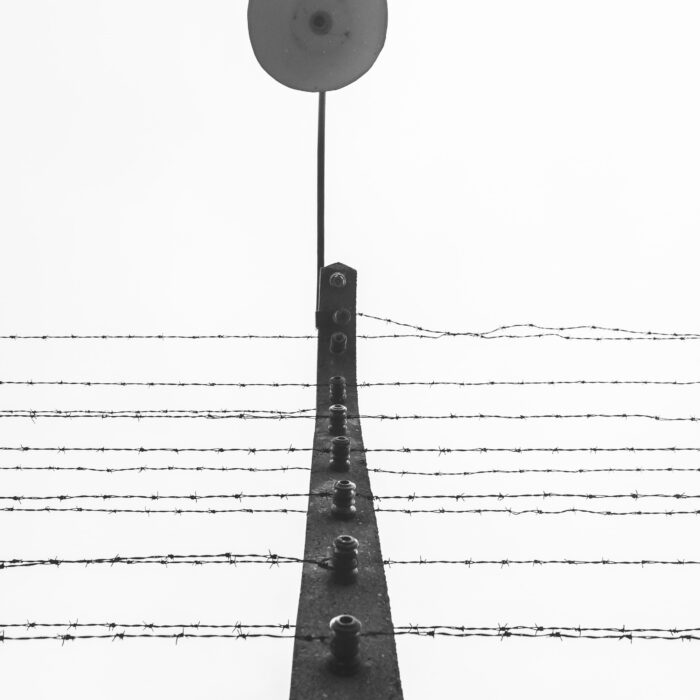You have no items in your cart. Want to get some nice things?
Go shopping
“Weather is immune to history, law, diplomacy, and sometimes even reason…”
Ed Falcón, chief meteorologist for El Paso’s biggest TV network, was appalled at how seldom people asked him about the nature of weather. His admirers and devotees were only interested in hearing about the immediate weather or the weather to come, never in discussing the weather that was. The public thinks that weather can be controlled but Dr. Falcón knew that weather is a mysterious tyrant, a chaos to death itself. People talk about weather because they can’t talk about death. That is why war makes for the most curious conversation and weather data: At Ypres, the rain fell in helixes and tasted like almonds; at Bastogne, curious dendritic formations in the snowflakes made for heavy snow; in the aftermath of Nagasaki, the wind blew from the ground up for a week.
Weather is immune to history, law, diplomacy, and sometimes even reason, so meteorologists and climate scientists like Dr. Falcón are often ridiculed. However, the Channel 4 viewers maintained their fidelity and holstered their complaints such that Dr. Falcón began to feel invincible, which got boring. El Paso enjoys 300 sunny days a year, and Dr. Falcón’s expertise at Channel 4 had, in his mind, gone too long unappreciated. He was tired of standing in front of a giant sun, and was looking for a meteorological challenge. New Year’s Eve was also fast approaching, a holiday during which Dr. Falcón felt he’d abased himself on live TV for far too long.
He knelt at his bedside and prayed to his saints for guidance and luck.
Dr. Falcón was, by El Paso standards, a minor celebrity. He appealed to viewers on both sides of the border. Weather is a great equalizer, and he was so fluent in both Spanish and English that nobody knew what he really was. He enjoyed watching people try to define him. They always stumbled:
- It’s racist to call someone Mexican. What are you?
- Si eres gringo, no me lo digas. Pero no eres. ¿Eres?
Dr. Falcón was savagely handsome. He was tall and broad-shouldered with grey-blue wolf eyes behind horn-rimmed glasses and a goatee surrounding thin, mandarin lips. A few years ago, he’d begun to sprout some grey hairs from his chin and used Grecian formula to mask it, but lately he’d let the grey show. With a forecast accuracy quotient of 98.71% over thirty years, Dr. Falcón allowed that he had a sliver of clairvoyance, but nobody had allowed him to produce the statistic. He was not afraid to be wrong in his forecasts, but by virtue of geography, he was rarely given the chance. What might that be like? he wondered. To forecast for high stakes? Whenever he was interviewed, the focus was usually on his clothes or hair.
“So…mousse?” asked the reporter from LatinXpose
“Clay.”
“Straight razor?”
“Electric.”
“Qué no.”
“Qué sí.”
A year ago, Dr. Falcón was the only meteorologist in Texas to predict the great gulf freeze of November 11th. And it wasn’t as if the other meteorologists hadn’t done their homework. “Weather,” or the prediction of it, is essentially mechanical. Mathematical equations are derived from observations made by machines running on other mathematics. Raw weather data is put into a model and the model is run.
“But to be a seer,” said Dr. Falcón to the reporter from the weekly magazine, El Paso Style, “you have to understand the atmosphere in which you’re forecasting, understand how nature and geology normally affect the area, and compare it to what is in your heart. And you have to know a little about the mind of God.”
The reporter nodded and asked him who he was wearing.
“My shoes are Berluti.”
“I love how you wear them with no socks,” she’d said.
The genesis of Dr. Falcón’s New Year’s Eve angst was tied to the year 1503, when Catalonia saw a bumper crop of table grapes. The grape farmers needed new ways for people to eat grapes, so a shrewd vintner contacted his connections in the friary, who laid out the vintner’s plan in front of the canon lawyers, and the plan was finally approved: At the stroke of midnight on New Year’s Eve, read the diocesan advisory, every good Catholic was recommended to eat twelve grapes for good luck against witchcraft. The vineyards flourished and the friaries gilded their bells.
500 years later, this sinister tradition spawned by the greed and paranoia of The Spanish Inquisition had landed in El Paso, Texas, where for the last thirteen years on New Year’s Eve, Dr. Falcón indulged his fan base and the network by eating a dozen grapes in twelve seconds on camera. Who had suggested this abomination in the first place? Dr. Falcón couldn’t remember how he’d come to accept the indignity, in part because he couldn’t remember that he himself was the one who suggested it.
Dr. Falcón was 55 now, and felt too sophisticated to perform the same tawdry routine he’d done for years. By now, the New Year’s Eve production had become as necessary and as predictable as a midnight kiss, and by the end, he usually had so many grapes in his mouth that he couldn’t count or talk anymore and that was good comedy. But with the comedy came a kind of existential melancholy. He wondered, is this what I am? I can’t be this. This year, he decided he would officially forego the New Year’s Eve indignity. He told everybody at the November staff meeting that he was done with silly rituals.
“I am a serious man,” he said. “And I take my role seriously. No more grapes.”
Dr. Falcón had been contacted the month before by the station manager at TV1 La Mejor out of Mexico City, and the two spoke for an hour. The station manager hinted they might be able to give him his own morning program. Dr. Falcón said he’d have to think about it. Mexico City had earthquakes and every extraction of meteorological anomaly.
“If I do it, they’ll be no gimmicks,” said Dr. Falcón. “I’m a seer and a scientist, not a boob.”
“I’ve seen your New Year’s broadcast, Dr. Falcón,” she said. “At La Mejor, I’ll personally guarantee that you’ll never have to eat another grape on TV ever again.”
“Let me feel it out,” said Dr. Falcón.
At the December staff meeting, nobody at Channel 4 seemed to appreciate that Dr. Falcón had stated clearly that he wouldn’t be doing the New Year’s Eve broadcast. After reading the episode mock-ups, he saw that he was slated to host the festivities on December 31st.
“I’ve told you more than once that I’m not doing New Year’s this year,” said Dr. Falcón, and hissed out a stream of smoke from his cigarette that exploded and mushroomed off of the station manager’s forehead, hung between them for a few moments as a poltergeist, then dispersed.
“Dr. Falcón, forgive me,” said the manager, “but it’s called a news team because we work as a team.”
“I will do anything for this team,” said Dr. Falcón. “Except the New Year’s Eve broadcast.”
“Take this up with the syndicate,” said the manager. “I’m done arguing.”
“You are the New Year’s Eve broadcast,” said the syndicate head, after the station manager told him to take his complaint to the top. “Besides,” said the executive, “You’re the one who suggested it. I remember specifically. You read an article about exotic traditions on a plane. I told you it was a gimmick, and I was right, but it was a gimmick that worked. So bully for you, and now you’re dug in.”
“What plane?”
The executive snorted and asked Dr. Falcón if he’d made any progress in his bid to quit smoking.
“I’m always making progress,” said Dr. Falcón, smoking.
“It’s making you look old.”
“Getting old is making me look old.”
“You’ll do the New Year’s thing then?”
“No,” said Ed.
“We’ll see,” said the executive, and hung up.
That evening, Dr. Falcón went to Rincón de Cherrie and had too much to drink. Then he went home and watched Patton, and that made him depressed, and he had a little more to drink. He went to the bathroom to shit. He was bored and had an erection, so he masturbated. He cleaned up and felt stupider and fell asleep. Dr. Falcón woke up to a message from the station manager at TV1 in Mexico City saying that she needed an answer from him cuanto antes because they wanted to introduce him during the New Year’s Eve broadcast.
He rose from bed and paced around in his bathroom, smoking, thinking about hydrogen cyanide. A hydrogen cyanide concentration of 300 mg/m3 in the bathroom would kill him in eight minutes. There is hydrogen cyanide in cigarettes. That was supposed to scare him, but he felt no fear. He was smoking right there in the shower. He toweled off, walked to his balcony and looked at the sky.
Nobody, thought Dr. Falcón, looks at the sky like I do: They see storm clouds and I see a somber spring of reason. They see smoke from the pit, and I see ice cubes skipped over the Lake of Fire. It rains fish in Honduras sometimes. Some clouds are so high that they refract light at dusk, after the sun has already set. It looks like the sky has been lit without a match. Strange things can happen outside: Supercells, witching drifts, idiot winds. He was still a little drunk from the night before, and he reached for a razor and threatened his face with cutting off its goatee.
He held another Zoom meeting with the station chief at TV1 La Mejor in Mexico City.
The station manager assured him there would be no clowns or adults dressed up as babies to co-anchor El Show de Falcón, which she said would be an opportunity for Dr. Falcón to address meteorology and its nuance, as opposed to a garden-variety morning show.
“No diets, no animals in costumes, no children with special talents?” asked Dr. Falcón.
“None of that,” she assured him. “Join us.”
The radioactive equilibrium model of the Earth also applies to people. The left side of the equation is living in warm light, and the right side of the equation is all dark and dead. At the station in El Paso, Dr. Falcón made one more plea to be given a furlough from his yearly indignity.
“With great influence comes great responsibility,” replied the Channel 4 station manager. “Here are your grapes,” he said, and handed Dr. Falcón a bag of grapes across which read “2020”. The grapes came from Rey del Oller vineyards, the grape monopoly who had a deal with Channel 4.
“I quit,” said Dr. Falcón, although he gave the ten-day forecast at 7pm.
During his last broadcast in El Paso, Dr. Falcón wished the Channel 4 audience Happy Holidays and guaranteed clear cool skies for the next week and a half, even though he’d looked at satellite data indicating a thermal whip snapping toward the east from Baja. He felt a pinch in his throat. It was dangerous to forecast against data, and in doing so, he felt both liberated and Promethean, torn between data and divinity.
“Adios amigos,” he said, and removed his earpiece and the ON AIR light went dead. Dr. Falcón instantly felt sheared from the old current of life, drove home, and packed his bags hastily, both proud and ashamed at his lack of things.
Just after departing on the midnight train from El Paso to Mexico City, an epileptic hail smashed against the cabin windows. Dr. Falcón watched and listened to the escapade of ice and snow and grit tore by in a riot. He sighed, his forecast forbidden. He looked inside his travel bag, fingered the sealed bag of twelve green grapes given to him by the station manager.
Suddenly, a ball of ice smashed a hole in a window, and little glass daggers pierced the polymer seat cushion across from Dr. Falcón. Wind whistled into the cabin and with icy pincers the storm clawed away at the crackling glass. Winds came from faraway places—stars and glaciers; a storm woven from the great, incomprehensible loom. A whistle then a roar. Dr. Falcón was embarrassed he’d let emotion infect his forecast, but he was on to greater things. A scent of tea roses, of slaughter, of cosmic particulate in the train car.
He closed his eyes, and ate one grape after another as the storm became intimate, passionate. The whole cabin soon filled with the rumble of matter versus anti-matter. The grapes were bloated and juicy, great green pearls. Dr. Falcón began a prayer of annihilation. He devoured his past in a handful of grapes.
When the train pulled into the Estación Buenavista in Mexico City, an intern from TV 1 La Mejor waited and waited until everybody seemed to have left the train. When he inquired about passenger Dr. Eduardo Falcón in the first-class compartment, an usher said that there was a problem.
“A medical problem,” said the usher with great solemnity.
An American tourist with no one to kiss was the first to recognize that Dr. Falcón was choking on grapes. She’d tried to revive him with some maneuvers but with no success. An ambulance left with Dr. Falcón inside. There was no need to hit the siren or the lights. Snow continued to fall over the zocalo as the ambulance made its way gingerly toward the morgue.
At midnight on New Year’s Eve in El Paso, Ana Barrera, the new meteorologist at Channel 4, went viral after she ate two-dozen grapes while singing all the words to ‘Auld Lang Syne’. The next week, she made an appearance on ‘El Show de Chango,’ the new morning talk show on Mexico City’s TV1 La Mejor, in which a monkey puppet has guests solve riddles.
Tyler Smith
Tyler Smith's writing has been featured in: McSweeney’s, Esquire, UTNE Reader, Tin House, HOBART, 3am Magazine, Electric Lit, and Texas Monthly, among others. He is the Director of Content at SuperWorldapp.com
- More Posts(1)




